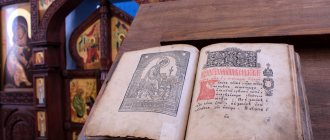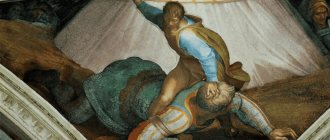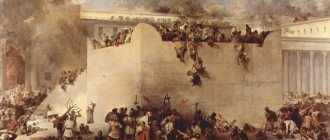Why read Psalm 4? What is the interpretation of the Psalm and what do its verses mean? You can listen online or read the text of the prayer Psalm 4 in Russian and Church Slavonic on our website.
Psalm 4 in Russian: text
1 When I called, the God of my righteousness heard me; in tightness You gave me space. Have pity on me and hear my prayer.
2 Sons of men, how long are you heavy-hearted? Why do you love vanity and seek lies?
3 And know that the Lord has made His holy one marvelous. The Lord will hear me when I cry to Him.
4 Be angry, but do not sin in what you say in your hearts; on your beds lament.
5 Offer the sacrifice of righteousness and trust in the Lord.
6 Many say, “Who will show us good?” – The light of Your face has marked us, O Lord!
7 You have given joy to my heart; they are filled with the fruit of the wheat, their wine, and their oil.
8 I will lie down in peace and immediately fall asleep, for You, Lord, have given me alone to live with hope.
Psalm 4 in Church Slavonic
1 Always call upon me; the God of my righteousness heard me, and in affliction thou didst spread me, be merciful to me, and hear my prayer.
2 Sons of mankind, how long is heaviness of heart? Do you love vanity and seek lies?
3 And bear in mind that the Lord has surprised His venerable one: the Lord will hear me whenever I cry to Him.
4 Be angry, and do not sin as you say in your hearts; on your beds be moved.
5 Eat the sacrifice of righteousness and trust in the Lord.
6 Many say: Who will show us good? The light of Your face shines upon us, O Lord.
7 Thou hast given gladness to my heart: by the fruit of wheat, wine, and oil, I have multiplied.
8 In peace together I will sleep and rest, for You, O Lord, alone have given me hope.
Text of prayer Psalm 4
When conducting services, the Church Slavonic or Old Church Slavonic language is used. With its help, prayer reaches the Lord and conveys the requests and pleas of believers
In Church Slavonic
Finally, in the songs of a psalm to David
1 Always call upon me; the God of my righteousness heard me, and in affliction thou didst spread me, be merciful to me, and hear my prayer.
2 Sons of mankind, how long is heaviness of heart? Do you love vanity and seek lies?
3 And bear in mind that the Lord has surprised His venerable one: the Lord will hear me whenever I cry to Him.
4 Be angry, and do not sin as you say in your hearts; on your beds be moved.
5 Eat the sacrifice of righteousness and trust in the Lord.
6 Many say: Who will show us good? The light of Your face shines upon us, O Lord.
7 Thou hast given gladness to my heart: by the fruit of wheat, wine, and oil, I have multiplied.
8 In peace together I will sleep and rest, for You, O Lord, alone have given me hope.
In Russian
If you read Psalm 4 in Russian, then the experiences and suffering of the singer, his confusion and desire to find the protection of the Lord become more understandable:
For performance, on strings. Song of David.
1 When I called, the God of my righteousness heard me; in tightness You gave me space. Have pity on me and hear my prayer.
2 Sons of men, how long are you heavy-hearted? Why do you love vanity and seek lies?
3 And know that the Lord has made His holy one marvelous. The Lord will hear me when I cry to Him.
4 Be angry, but do not sin in what you say in your hearts; on your beds lament.
5 Offer the sacrifice of righteousness and trust in the Lord.
6 Many say, “Who will show us good?” – The light of Your face has marked us, O Lord!
7 You have given joy to my heart; they are filled with the fruit of the wheat, their wine, and their oil.
8 I will lie down in peace and immediately fall asleep, for You, Lord, have given me alone to live with hope.
Brief interpretation
The fourth Psalm can be briefly interpreted as follows:
- When I pray to you, God, hear me. When I was bad, You supported me. And now show me your mercy and hear what I pray to You.
- People, how long will you fuss and believe everything that they tell you?
- God separated me, the king, from other people and called me his holy man.
- When you are angry, do not sin. It’s better to lie down and calmly think about life and the circumstances in which you are now. Only in this way will consolation come to you, and there will be peace in your heart.
- You need to trust in God, and not in anything else in this world, because everything is temporary, but God is permanent.
- People ask about who would show a good life. David asks God to do this for them.
- The Lord has blessed the people more than once, and will continue to take care of them. He makes sure that people have everything they need for life and even more.
- David lies down calmly and sleeps because he knows that he is safe with God. He does not rely on his numerous guards. He believes God and trusts Him with his life.
The fourth Psalm consists of 9 verses and 16 sentences. Found on pages 569 and 570 of the Bible. King David performed the fourth Psalm for the leader of his choir.
History of writing
The exact time when Psalm 4 was written has not been established, but it is certain that its author was David. From it it is clear that the story is about a difficult time in the life and reign of King David. There were many dissatisfied people, but the source of this discontent is unknown. Perhaps this is a war or an escape from Abbesalom, the son of David, who sought to take his father’s throne during David’s lifetime - there are no exact indications of this.
Opinions vary regarding the events that inspired the song. However, everyone agrees that at this time David was overwhelmed with experiences and suffering, but constantly turned to the Lord, trusting in his help and protection.
At the same time, life testified that the king was constantly under the protection of the Almighty: there was always a way out of the most difficult situations, and David remained alive and healthy even after the most difficult battles. And during the period discussed in Psalm 4, David is confident that he will definitely receive the support of the Lord.
References
- Berlin, Adele; Brettler, Mark Zvi (2004). "Psalms". In Berlin, Adele; Brettler, Mark Zvi; Fishbane, Michael A. (ed.). Hebrew Bible
. Oxford University Press. item 1282. ISBN 9780195297515 .CS1 maint: ref = harv (link to website) - Kugel, James L. (2017). The Great Shift: Encountering God in Biblical Times
. Houghton Mifflin Harcourt. paragraph 132. ISBN 978-0-544-52057-8. Retrieved June 13, 2022. - The fate of the righteous in the psalms
. Bowls Press. paragraph 9. ISBN 978-0-8272-3674-5. Retrieved June 13, 2020. - Metzger, Bruce M.; Coogan, Michael David (1993). The Oxford Companion to the Bible
. Oxford University Press. p. 626. ISBN 978-0-19-974391-9. - ^ a b
Church of England, Book of Common Prayer: The Psalter as printed by John Baskerville in 1762. - The Artscroll Tehillim page 6
- Psalms: Translated and Explained by Joseph Addison Alexander, Ernst Wilhelm Hengstenberg, page 26
- Commentaires sur les psaumes, d'Hilaires de Poitiers, IVe siècle, Paris, Éditions du Cerf, 2008, sources collection chrétiennes n ° 515.
- Commentaire sur les psaumes (jusqu'au psaume 54), de saint Thomas d'Aquin, 1273, Éditions du Cerf, 1996.
- https://www.journal33.org/other/html/otinstr.html
- https://en.wikiversity.org/wiki/Music_in_the_Bible_(Psalms)
- https://www.kingjamesbibleonline.org/Psalms-Chapter-3/
- Jewish Encyclopedia, Sela
- Psalm 4:7: NIV translation
- Alden, Robert L., Chiastic Psalms, Journal of the Evangelical Theological Society
, accessed May 7, 2022. - The Complete Artscroll Siddur, page 295
- Complete list of Artscroll Machzor for Rosh Hashanah p.79
- See also Sefer Tehilim, de Rachi, XIe siècle.
- Kirkpatrick, A. F. (1901). The Book of Psalms: With Introduction and Notes
. Cambridge Bible for Schools and Colleges. Book IV and V: Psalms XC-CL. Cambridge: University Press. item 838. Received February 28, 2019. - "Psalmody of Saint Benedict." University of Toronto. Retrieved October 21, 2022.
Why is Psalm 4 read?
Reading a prayer is appropriate when a person has a feeling of hopelessness from the problems that have piled up, if it is difficult for him to cope with despair and negative emotions, if his faith is weakening. When illnesses overcome, and financial problems seem insoluble, the words of prayer addressed to the Lord will help. In order for requests to reach the Lord, you need to read the text of Psalm 4 with complete trust in God and an open heart.
The prayer is suitable for reading to people who are nervous and unbalanced, constantly worried about every little thing, fussy, constantly sorting things out. To get rid of empty vanity and unnecessary anxiety, it is important to turn to the Lord, pacifying your anger.
Interpretation
In order to more deeply feel the whole tragedy of the situation that David narrates, an interpretation is required: the opportunity to gain strength and find the protection of God. The interpretation reveals the deep meaning of Psalm 4.
- Verse 1: David speaks directly to God and asks to hear his prayer. The disasters that befall a person are the result of his lack of faith in the Lord. To get rid of these “shackles”, you need to turn to God.
- Verse 2: In it the king wonders why the “sons of men” live in lies and vanity when they can be in peace and quiet.
- Verse 3: The king calls on his people to turn to God and admire his works, to believe in his power and the works of the Lord, just as he believes that God will not leave them without help and support.
- Verse 4-5: It is a call to come to your senses and repent. Everyone is free to express their thoughts and disagreement, without breaking the laws of God and without stooping to sin. To accuse, you need to analyze the situation and find out how justified the condemnation and anger are, whether the guilt of the one who is accused of all sins has been proven.
- Verses 6-8: filled with sincerity, bright feelings and faith in God. He helped when David’s circle was on the verge of despair due to a lack of understanding of what was happening and “daily bread.” It was at this time that God's help came. And although all problems are still far from being resolved, the king is completely confident in the mercy of the Lord, so he calmly goes to bed, despite the unfriendly surroundings.
( 1 ratings, average: 5.00 out of 5)
A Psalm of David for people to put aside their anger and turn to the Lord
Reading the fourth Psalm is necessary for those people who are irritable, fussy and nervous. For those who find it difficult to pull themselves together and calm down. Who constantly worries about all sorts of little things. Likes to quarrel and sort things out. They are fussing in vain. They cannot completely trust God and place all their problems on Him. It is not known for certain when exactly this Psalm was written by David. But it was clearly a difficult time for him. Then his glory as a king was desecrated. Many were unhappy with his rule. Maybe there was a war at that time, maybe he was fleeing from his son Absalom, who wanted to take his throne while his father was still alive. Historians have differing opinions.
But one thing is clear: David was worried about the unrest among his people and his precarious position. But he continued to trust in the Lord, who never let him down. And this time the king was sure that everything would be fine. God had proven to David many times before that he was always nearby and made sure that nothing threatened David’s life. No matter what battles David participated in, he always returned from the battlefield alive and well. And now, no matter how hard it would be in the king’s heart, I am sure that the Almighty will not leave him, but will support him, as he did throughout the man’s life.
Detailed interpretation
The fourth Psalm of the Old Testament can be divided into 5 parts:
- David sings a Psalm and asks the Lord that God will be with him as he calls upon Him (verses 1-2).
- David asks the people about vanity and lies (verses 3-4).
- The king advises against sinning by being angry (verses 5-6).
- Thank God for His care for the people (verses 7-8).
- David expresses confidence in God (verse 9).
The division is conditional, made in order to better understand the meaning of the Psalm and its main idea.
Part 1 – David's request that God hear his prayer
Verse 1
The psalm is sung by David. This is the first Psalm that the king sings for the leader of his choir. To glorify God, he had a choir in which he loved to sing, because praising God, especially in the morning, was a primary and very important task for him.
There are no parallel verses of Scripture.
Verse 2
David calls God the God of his truth, asks to have mercy on him and to hear his prayer. “When I was in distress You gave me plainly” are words that mean that when David was in difficult or straitened circumstances, God freed him and helped him out. This has always been the case. Therefore, David still trusts God and knows that the Lord will not be slow to support him and comfort him.
There are no parallel verses of Scripture.
Part 2 – David addresses his people and his enemies
Verse 3
“Sons of husbands” are ordinary people, men. David addresses them with a question about why they choose vanity and lies. The king is always pleased when his people are in peace and tranquility. But during that period of time, people, believing the lie, rebelled against the king, became fussy, and their anger flared up. That is why David complains that “his glory is in reproach,” that is, it means nothing to the people. His greatness does not make people meek, they do not bow before him as they would a king, they do not tremble, they do not respect him.
No Parallel Scripture Verses
Verse 4
The King continues to address the people in his prayer and tells them that God cares for them by setting them apart for Himself. David calls himself a saint because he is confident that he is not sinning against the Lord, but is doing exactly what God tells him to do. The King knows and therefore claims that the Almighty hears him when he prays and cries to Him. Where does the king get such confidence?
He is unshakable in his faith, because God has shown David more than once throughout his life that he always helps him. Even as a teenager, when David was tending his father’s sheep, it happened that a wild animal would attack the flock. David was young, but he could handle the animal and protect the livestock from ruin. He entered into battle with a predator and won more than once. But before that, he internally prayed to God to support him and help him defeat the wild animal. And God gave him strength to fight in a seemingly unequal battle.
God was with him when David had to kill 100 foreigners in order to marry the king's daughter when Saul ruled the people. This was the royal command - he gives his daughter Michal to David only after he brings him a hundred pieces of clothing from the Philistines (enemies). The edge of the garment could only be cut off from a dead enemy. David went to battle for the sake of his beloved and won. And then he cried out to the Lord to support him. Therefore, in this Psalm he is not left with the hope that even now the Lord will not abandon him.
There are no parallel verses of Scripture.
Part 3 – David talks about anger and its manifestations
Verse 5
“If you are angry, do not sin” means that anger in itself is not a sin. You can be angry, angry, upset. But...there is no need to sin at this time. That is, to take actions that will turn out to be sinful. For example, swearing, fighting. Such actions are already a sin. This is exactly what David is talking about. What does he propose to do in this situation? When anger is overwhelming and you want to do something bad, the Tsar tells the person to just lie down and think. This is evidenced by the expression “on your beds.” It is better to think and reflect on life while in a calm, peaceful position, that is, lying down.
For many this may seem strange. However, modern psychologists adhere to this rule. In their offices, clients do not sit or stand, but lie on special couches - chairs laid out so that the person is in a horizontal position. Scientists have long proven that lying down helps bring the emotional state back to normal. David, knowing him, advises angry people not to resort to curses and assault, but to think about their behavior and life circumstances while lying down.
Parallel Scripture Verse:
- Eph 4:26 – You must not sin when you are angry. The sun should not rise when a person is still in an irritated state. That is, even before dawn a person should calm down; he should not go to bed angry. It is necessary, having taken a horizontal position, to come to a state of calm, so that by the morning, when dawn, you will be calm and balanced.
Verse 6
David tells the people that their sacrifices to God should be sacrifices of righteousness. So that they are honest before the Lord and come to Him in prayer without lies and guile. Because God knows what is in the heart of each of them. There is no point in lying to the One who knows everything in advance. The king advises to trust not in one’s own strength, connections, position in society, money and other temporary things, but in the Lord. To the one who is constant and unchanging.
There are no parallel verses of Scripture.
Part 4 – Words about God showing himself to the people, as he did before
Verse 7
People, in despair, ask about who would show them good. That is, it would improve their lives. This is very similar to modern times and people who complain about the government, saying that life has become unbearably difficult. They are waiting for a president who, with his decrees, would ease the burden of the people. However, this does not happen. Because every subsequent ruler is not liked by the people in some way. Such blasphemy only aggravates the already difficult situation in the country.
David in this case asks God for help. He says that you don’t need to rely on a person, because he is just a person who also has his own shortcomings and fears. Therefore, they need to trust and expect changes in a positive direction in God, who has the power to change their lives, turning negative consequences into positive and positive changes.
There are no parallel verses of Scripture.
Verse 8
David tells God to fill his heart with joy, because the Lord himself cares about his people and country. Fills people's homes with “bread and wine” and everything necessary for life. And he, as a king, does not need to worry and worry. He is grateful to God that the Lord helps him rule the country, gives him wisdom and strength, patience and courage. His people live in abundance and lack for nothing.
But David understands that without God he could not give people what they want. This is similar to modern presidents who do not rely on God for their rule, but rely on their own strength. And they fail in several areas of their lives. Why are people not always happy with their rule and reforms? David is a wise king who understands that his strength is not endless, and he simply cannot cope without God.
There are no parallel verses of Scripture.
Part 5 – David is calm in his hope in God
Verse 9
David calmly lies down and sleeps, telling the Lord that He “only allows him to live in safety.” That is, he does not rely on his guards and the high walls of the castle. He completely trusts God with his life and sleep. Only with faith in Him does he feel safe. How often modern people cannot sleep because they worry about their problems. And David calmly went to bed and fell asleep, because he knew that he was completely safe. He is confident in the future and is unshakable in this.
There are no parallel verses of Scripture.







